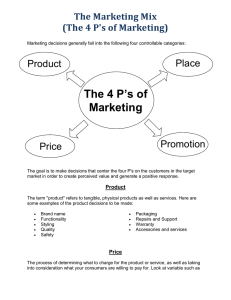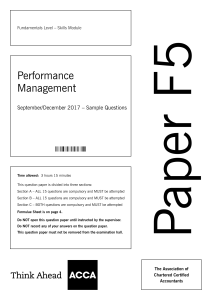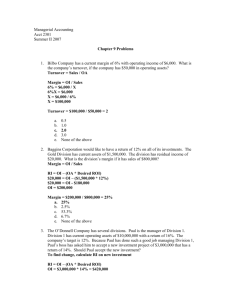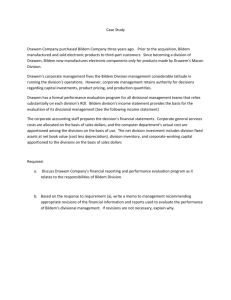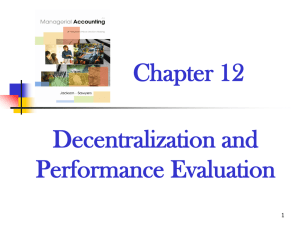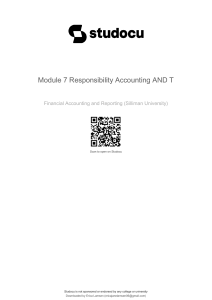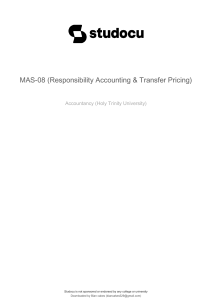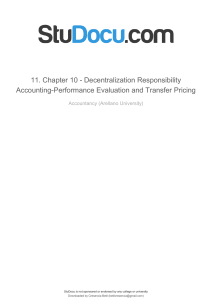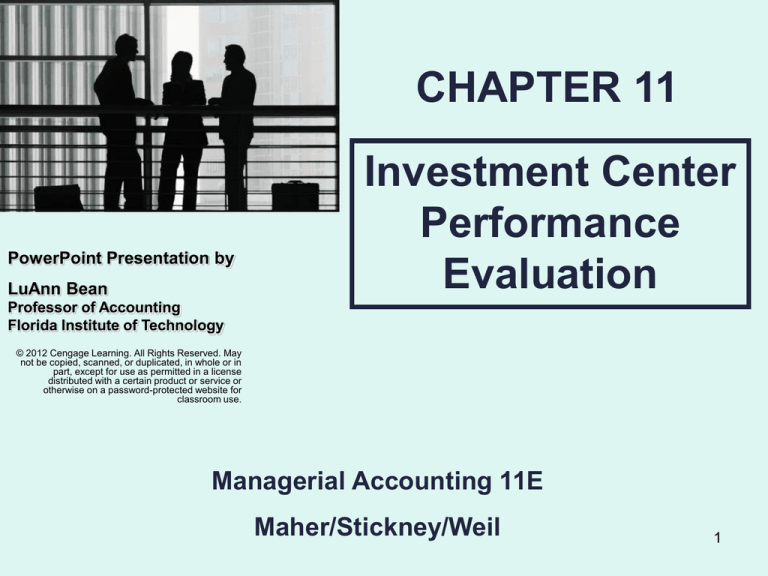
CHAPTER 11
PowerPoint Presentation by
LuAnn Bean
Investment Center
Performance
Evaluation
Professor of Accounting
Florida Institute of Technology
© 2012 Cengage Learning. All Rights Reserved. May
not be copied, scanned, or duplicated, in whole or in
part, except for use as permitted in a license
distributed with a certain product or service or
otherwise on a password-protected website for
classroom use.
Managerial Accounting 11E
Maher/Stickney/Weil
1
☼
CHAPTER GOAL
☼
Chapter 11 discusses concepts and methods for
measuring performance and controlling
activities in multidivisional companies that
have both manufacturing and nonmanufacturing divisions.
2
LO 1
DIVISION: Definition
Is a segment that conducts both
production and marketing
activities.
3
LO 1
DIVISIONS
A division may be a profit center,
responsible for revenues and operating
costs.
A division may also be an investment
center, responsible for assets in
addition to revenues and operating
costs.
4
LO 1
ADVANTAGES OF
DECENTRALIZATION
Major advantages of decentralization (authority and
responsibility are delegated from top management)
include:
Enabling local personnel to respond quickly to a changing
environment.
Freeing top management from detailed operating decisions.
Dividing large, complex problems into manageable pieces.
Training managers and providing a basis for evaluating
their decision-making performance.
Motivating ambitious managers.
5
LO 1
DISADVANTAGES OF
DECENTRALIZATION
Major disadvantages of decentralization include:
Local managers do not act to achieve the overall
goals of the organization.
Possible conflicts between goals of a division and
those of the organization.
6
LO 1
PERFORMANCE EVALUATIONS
Top management should distinguish
between an organizational division and
the division manager. Many measures
used to evaluate divisions can/should
be adjusted to account for revenues,
costs, and investments that are
controllable by its manager.
7
LO 2
RETURN ON INVESTMENT (ROI):
Definition
Is a method of evaluating
performance based on assets
invested.
ROI = Division operating profit
÷ Division Investment
8
LO 2
QUESTIONS FOR ROI
Before applying ROI, managers must find
answers to several questions:
How does the firm measure revenues?
Which costs does the firm deduct in measuring
divisional operating costs?
How does the firm measure investment?
9
LO 3
TRANSFER PRICE: Definition
Is the value assigned to goods
or services transferred from one
unit to another within the
organization.
10
LO 4
SETTING TRANSFER PRICES
Management must consider congruence with
organizational goals when setting transfer
prices. Methods of setting transfer prices
include:
1. Top management intervenes to set prices
2. Top management establishes policies for
setting transfer prices
3. Division managers negotiate their own
transfer prices
11
LO 4
TRANSFER PRICING
POLICIES 1
Management has several choices for transfer
pricing policies
Market-price based
Best in competitive market
Only if market prices are readily available
12
LO 4
TRANSFER PRICING
POLICIES 2
Management has several choices for transfer pricing policies
Transfer prices based on cost
Full-absorption costs
Only if differential or variable costs are available
Activity-based costing
Cost-plus pricing
Standard costs or actual costs
13
LO 4
TRANSFER PRICING
POLICIES 3
Management has several choices for transfer pricing policies
Other motivational aspects
Dual pricing
Provides selling division with profit but charges buying
division with costs only
Other incentives
Balanced scorecard
Basing part of supplying manager’s bonus on purchasing
center’s profits
14
LO 4
NEGOTIATED PRICES
There are advantages and disadvantages to
having managers negotiate transfer
prices.
Advantage: preserves autonomy of
division managers
Disadvantages
Consumes management time
May depend on manager’s negotiating ability
15
LO 4
DECISION RULE
The economic transfer pricing rule to
maximize Company profits is to
Transfer at the differential outlay cost to the
selling division (VC), + opportunity cost
of making internal transfers ($0 with
idle capacity; selling price – VC
with no idle capacity)
16
LO 5
DIRECT and INDIRECT
COSTS: Definition
Refers to whether cost
associates directly with the
division.
17
LO 5
CONTROLLABLE and NONCONTROLLABLE: Definition
Refers to whether the division
manager can affect the cost.
18
LO 5
DIRECT and INDIRECT
COSTS
Managers should be held responsible for
direct costs (any cost necessary to
operate). They are always deducted for
performance evaluation of a division
whereas manager evaluation should
only include direct costs that are
controllable. Similarly, divisions can
partially control indirect controllable
costs.
19
LO 6
ROI COMPONENTS
Management must decide (a) which assets
to include in the investment base and
(b) what valuation to use for those
assets. Problems occur when assets are
shared among divisions or when
considering centralized services.
Valuation may be net or gross book
value.
20
LO 8
PROFIT MARGIN
ROI =
Profit Margin
Divisional Revenues X
PROFIT MARGIN
PERCENTAGE
Divisional Revenues
Divisional Investment
INVESTMENT
TURNOVER
RATIO
21
LO 8
PROFIT MARGIN PERCENTAGE:
Definition
Indicates the portion of each
dollar of revenue that is profit.
22
LO 8
INVESTMENT TURNOVER
RATIO: Definition
Is the ratio of divisional sales to
investment in divisional assets;
a measure of the effective use
of invested funds.
23
LO 8
MINIMUM ROI
Management must set a standard
or desired ROI rate for each
period and a minimum ROI for
each division.
24
LO 9
ECONOMIC VALUE ADDED
(EVA): Definition
Is the amount of earnings
generated above the cost of
funds invested to generate those
earnings.
25
LO 9
EVA
EVA =
Net operating profit after tax (Weighted-average cost of capital X Investment)
Where Investment is (Total Assets – Noninterest-bearing
current liabilities)
26
LO 9
Adjusting GAAP data for
incentive plans
The main adjustments made to GAAP data for incentive
plans include:
Capitalize/amortize R & D expenditures and customer
development, advertising, promotion expenditures
Capitalize/amortize employee training expenditures
Make price-level adjustments
Use market values of assets to assess value declines
Restate inventories at replacement cost.
Do not amortize goodwill.
27
End of CHAPTER 11
28

